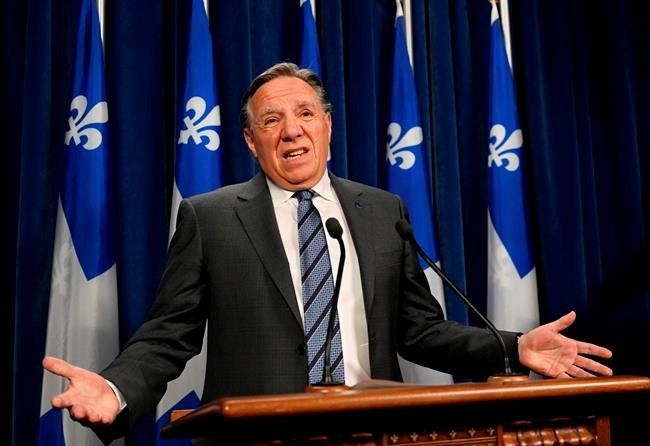Quebec Premier François Legault says his Coalition Avenir Québec party will no longer accept donations amid mounting allegations that mayors were pushed to pay for access to cabinet ministers.
Instead, Legault said Thursday his party will rely exclusively on government funding, and he called on other parties to do the same, warning he may change Quebec's party financing rules if the opposition doesn't follow his lead.
The announcement comes after members of the CAQ were accused of selling access to ministers by encouraging mayors to pay to attend party fundraising events. The Canadian Press reported earlier this week that almost half of Quebec's mayors have contributed nearly $100,000 to the CAQ's coffers since the 2021 municipal election.
"I want to be very clear, my (members of the legislature) didn't do anything wrong, but it's the perception, it's the way people see that," Legault told reporters in Quebec City. "They think that because a minister is at a cocktail (party) that there's expectations to give a contract in exchange. It never happened, but it's important, the image of integrity, at least for me."
The move would give Legault's party a serious advantage if the other parties follow suit. Due to Quebec's political financing system, which offers parties yearly "allowances" based on their share of the vote in the most recent general election, the CAQ receives millions more per year in taxpayer money than the opposition.
The Parti Québécois, for instance, which is leading in the polls, raised nearly $1.6 million from donors — more than any other provincial party — in the 2022 general election year and received an allowance of $2.8 million; the CAQ raised nearly $1.4 million that year, and received an allowance of almost $6.4 million.
Legault said he wants to have discussions with the other parties about how the system would work without donations, adding that there would have to be exceptions for new parties.
The PQ was quick on Thursday to reject Legault's call, with leader Paul St-Pierre Plamondon describing it as an act of panic. Legault should stop "monetizing access to ministers and not punish citizens by preventing them from participating in our democratic life," he wrote in a post on the X platform, formerly Twitter.
During question period, interim Liberal Leader Marc Tanguay described the announcement as a sign of the Legault government's "complete loss of control," while Gabriel Nadeau-Dubois, house leader of Quebec solidaire, the other party with seats in the legislature, said small donations are healthy for democracy.
Quebec has some of the country's strictest election financing laws, brought in after a public inquiry, the Charbonneau Commission, uncovered links between donations to political parties and the awarding of contracts and government subsidies.
Only individuals — not companies or unions — can donate to political parties in Quebec, and those donations are capped at $100 a year, with an extra $100 allowed during elections.
Lori Turnbull, a management professor at Dalhousie University who has studied election financing in Canada, said that while donations are capped to prevent undue influence and level the playing field, "they exist because it's a legitimate form of political expression, and to tell people that you can't donate to your preferred candidate or party is to limit the extent to which a citizen can amplify their own views."
Banning donations could also prevent people from having a real stake in the parties they support and chips away at one of the mechanisms that members can use to hold leaders accountable, she said in an interview Thursday.
It would also entrench the financial advantage of incumbents, she said. "By cutting off public donations to other parties, you are completely eliminating political parties' ability to build popularity on the basis of their ideas and then raise more money."
While the federal government and some other provinces have followed Quebec's lead and banned corporate and union donations, the federal per-vote subsidy was eliminated by Stephen Harper in 2015, and maximum contribution remains higher, said Lisa Young, a political science professor at the University of Calgary.
Young, who said she has never heard of a major Canadian political party renouncing donations like the CAQ has done, said fundraising can be thought of "as one of the ways that political party organizations remain connected to the electorate."
This report by The Canadian Press was first published Feb. 1, 2024.
— By Jacob Serebrin in Montreal with files from Patrice Bergeron in Quebec City.
The Canadian Press

